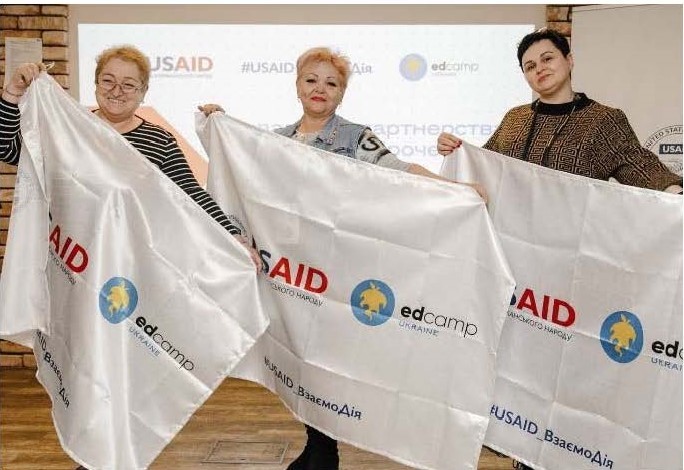Speeches Shim

Teachers use USAID anti-corruption toolkit to teach civic responsibility to students
Alla Ryabukha and Lyudmyla Khorkova are seasoned education professionals with many years in teaching and administrative positions.
Ms. Ryabukha is the head of the State Education Quality Service in Sumy Oblast with experience as a school director and an economics teacher. Ms. Khorkova is a school director and a history teacher. Both have encountered academic dishonesty and corruption.
“Cheating, plagiarism, and other forms of deceit are extremely harmful. All need to be addressed and cut at its roots because they are fertile soil that lead to crimes like bribery and worse,” said Lyudmyla.
In their quest to improve Ukrainian education, Alla and Lyudmyla learned about EdCamp Ukraine, a series of participant-driven events called “unconferences,” where like-minded educators enrich their professional development through an open exchange of teaching experiences, cooperation, and problem-solving. EdCamp Ukraine holds in-person training workshops as well, although these are on hold because of the COVID-19-related national quarantine.
USAID’s Support to Anti-Corruption Champion Institutions (SACCI) activity, worked with EdCamp Ukraine to develop an anti-corruption (AC) youth toolkit for teachers to use in their classrooms to encourage youth to reject corruption as a social norm. After learning about SACCI’s anti-corruption tools at an EdCamp Ukraine event, Alla and Lyudmyla shared them with fellow teachers and began using them in the classroom to help their students develop a zero tolerance for corruption.
At EdCamp events, they now lead sessions for other teachers on using the AC tools.
“Once I learned about the anti-corruption tools, I immediately saw the benefits and found a lot of ways to use, improve, and help colleagues in their application,” said Lyudmyla.
Underpinning the teaching concept is the belief that the more a teacher discusses corruption with students, the more they realize that corruption is present in ordinary life and not just in the high-profile scandals covered in the media.
“Talking with kids about corruption and academic dishonesty is relevant and, more importantly, necessary. Right from the start, we must impress upon them that corruption is the wrong choice,” Alla explains.
She and the other teachers in the program believe that teaching personal integrity through the toolkit is effective because young people like to play games and engage their brains in wondering “why?” and “how?”. They hope the impact of the lessons reverberates beyond the young people upward to their parents to impact their behavior, too.

Comment
Make a general inquiry or suggest an improvement.